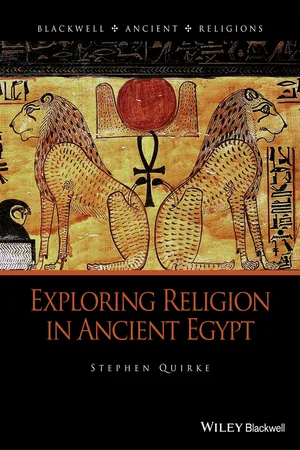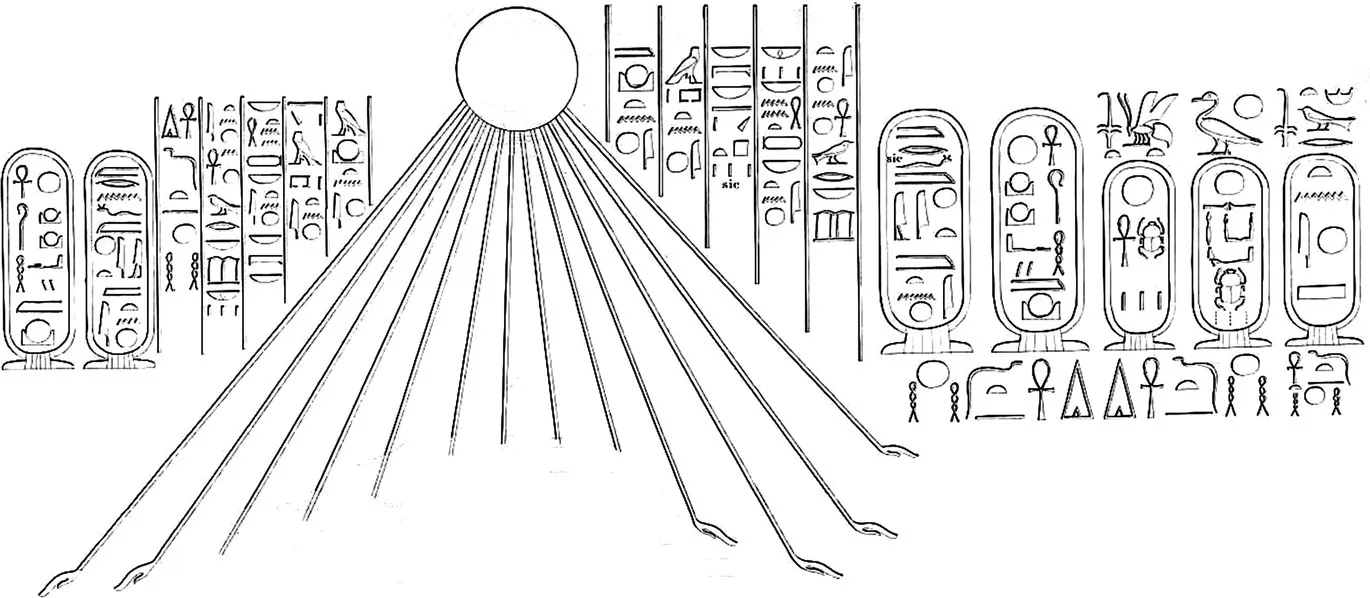
- English
- ePUB (mobile friendly)
- Available on iOS & Android
eBook - ePub
Exploring Religion in Ancient Egypt
About this book
Exploring Religion in Ancient Egypt offers a stimulating overview of the study of ancient Egyptian religion by examining research drawn from beyond the customary boundaries of Egyptology and shedding new light on entrenched assumptions.
- Discusses the evolution of religion in ancient Egypt – a belief system that endured for 3,000 years
- Dispels several modern preconceptions about ancient Egyptian religious practices
- Reveals how people in ancient Egypt struggled to secure well-being in the present life and the afterlife
Frequently asked questions
Yes, you can cancel anytime from the Subscription tab in your account settings on the Perlego website. Your subscription will stay active until the end of your current billing period. Learn how to cancel your subscription.
No, books cannot be downloaded as external files, such as PDFs, for use outside of Perlego. However, you can download books within the Perlego app for offline reading on mobile or tablet. Learn more here.
Perlego offers two plans: Essential and Complete
- Essential is ideal for learners and professionals who enjoy exploring a wide range of subjects. Access the Essential Library with 800,000+ trusted titles and best-sellers across business, personal growth, and the humanities. Includes unlimited reading time and Standard Read Aloud voice.
- Complete: Perfect for advanced learners and researchers needing full, unrestricted access. Unlock 1.4M+ books across hundreds of subjects, including academic and specialized titles. The Complete Plan also includes advanced features like Premium Read Aloud and Research Assistant.
We are an online textbook subscription service, where you can get access to an entire online library for less than the price of a single book per month. With over 1 million books across 1000+ topics, we’ve got you covered! Learn more here.
Look out for the read-aloud symbol on your next book to see if you can listen to it. The read-aloud tool reads text aloud for you, highlighting the text as it is being read. You can pause it, speed it up and slow it down. Learn more here.
Yes! You can use the Perlego app on both iOS or Android devices to read anytime, anywhere — even offline. Perfect for commutes or when you’re on the go.
Please note we cannot support devices running on iOS 13 and Android 7 or earlier. Learn more about using the app.
Please note we cannot support devices running on iOS 13 and Android 7 or earlier. Learn more about using the app.
Yes, you can access Exploring Religion in Ancient Egypt by Stephen Quirke in PDF and/or ePUB format, as well as other popular books in History & Egyptian Ancient History. We have over one million books available in our catalogue for you to explore.
Information
Chapter 1
Belief without a Book

Word Worlds: Ancient and Modern
Religion?
In this book, I seek to address those questions of life in ancient Egypt that most speakers of modern European languages might place under the word religion. More neutrally, the core question could be rephrased as: how did inhabitants of Egypt in ancient times express their places in the worlds of Nile and Sahara and their relation to one another, to other peoples, and to the forces and features of life? The terms religion, from Latin, and philosophy, from Greek, can be used for these topics, but both belong firmly within European histories and therefore carry associations that may fail or obscure attempts to understand non-European settings. The French writer Jacques Derrida has emphasized the specifically West European weight of the word and concept religion (Derrida 1998). If we replace religion with the word belief, we find the same risks of imposing alien ways of thinking on other peoples (Davies 2011). Today, the declaration “I believe in One God” defines the speaker as not believing that there are many gods, as holding one belief and not another. Such affirmations place belief in a system of choices, where personal faith may be built on the rock of one Holy Book, as with the Torah of Judaism, Christian Bible, and Quran of Islam. Before and outside the idea of the sacred book, faith and belief may not be matters of choice between opposing systems. Whereas religions of the book refer explicitly to other options of believing or disbelieving, a human group may instead express itself without reference to any contemporary or earlier other society or way of expression.
An analogy might be drawn with literacy. A part-literate society deploys writing in different ways to a fully literate society; in part literacy, then, our clearest analogy would be not reading-and-writing literacy, the norm in richer countries, but computer literacy, still variably extended through social lives. Today, religion occupies a part in a society, even in a deeply religious society, because the religion expresses itself in relation to other religions and other beliefs such as agnosticism or atheism, denoting them, for example, as superstition, paganism, or apostasy. Most sources for ancient Egyptian society correspond instead to a single expression of being in the world: the expression applies across not a part, but the whole, of social life—much as reading–writing literacy may cover most of West European or East Asian society.
After 525 BC, long-term foreign rule brings different belief systems into the Nile Valley more emphatically than before. Achaemenid Iranian rule (525–404, 343–332 BC) introduced Zoroastrian ideas as well as some larger Jewish communities into Egypt; Macedonian Hellenistic rule (323–30 BC) then installed the Greek. When Egypt became a province of the Roman Empire after 30 BC, the pace of Hellenization increased, accompanied strongly from the third century AD by conversion to Christianity, the state religion from AD 313. With these changes, the final millennium of ancient Egyptian religion seems to involve a mixed environment structurally closer to the present world of differing belief systems (see papers in Clarysse et al., 1998).
By contrast, in the history of Egypt from the first writing (3100 BC) to the beginning of Achaemenid Iranian rule (525 BC), only once was a different choice expressed as the new and now sole option: years 5–17 in the reign of King Akhenaten. For those dozen years, old expressions of a divine Hidden One (in Egyptian Amun) were physically erased in word and image, and all images of the king were directed to a new formulation expressed in image as a sun sphere (in Egyptian Aten) extending the hieroglyph ankh, “life,” to the nose of the king, and in words as “Ra Horus-of-the-Horizon, rejoicing in the horizon, in his name as Light which is in the aten” (Figure 1.1). The next generation restored the earlier system (Figure 1.2) and eventually dismantled the monuments of Akhenaten; later king lists omitted the names of those who had made offerings to the creator in the formula “Ra Horus/Ruler-of-the-Horizon, rejoicing in the horizon, in his name as Light which is in the aten.” Egyptologists have emphasized this reign as a breakthrough in the history of religions, as the first visible example of monotheism or of belief, and as the exception that illustrates what was ancient Egyptian religion for the rest of this 2500-year span (Assmann 2001). The Akhenaten rupture may be of particular fascination for twenty-first-century readers also because they can more easily understand it as a choice in belief, confirming the modern meaning of religion. For other periods, without that apparent choice, the words belief, faith, and religion may stand in the way of an attempt to understand the lives and self-expression of past people.

Figure 1.1 Visualizing the creator as sun disk with two kingly names, as formulated in the reign of King Akhenaten, North Tombs of high officials, Akhetaten, about 1350 BC.
From Richard Lepsius (ed.), Denkmäler aus Aegypten und Aethiopien, Berlin 1849–1859, vol.3, pl.99.

Figure 1.2 The creator expressed in animal–human form sailing over the defeated force of chaos, depicted as giant snake, tomb of King Sety I, Valley of the Kings, Waset, about 1290 BC. © Gianluca Miniaci.
Modern study of ancient worlds
The words for the object of study are not the only obstacles: the words for, and practices of, t...
Table of contents
- Cover
- Blackwell Ancient Religions
- Title page
- Copyright page
- Preface
- Chapter 1: Belief without a Book
- Chapter 2: Finding the Sacred in Space and Time
- Chapter 3: Creating Sacred Space and Time: Temple Architecture and Festival
- Chapter 4: Chaos and Life: Forces of Creation and Destruction
- Chapter 5: Being Good: Doing, Saying, and Making Good Possible
- Chapter 6: Being Well
- Chapter 7: Attaining Eternal Life: Sustenance and Transformation
- Bibliography
- Index
- End User License Agreement